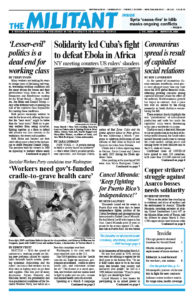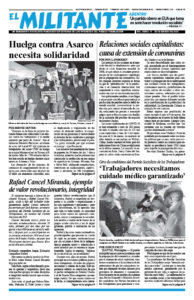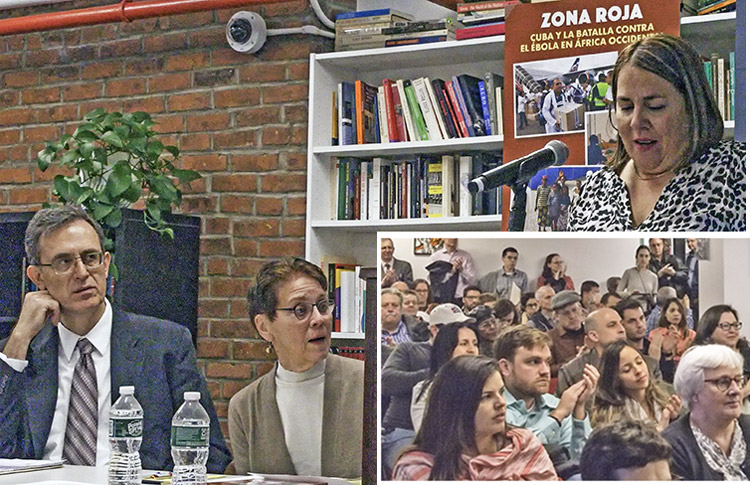NEW YORK — “A people aiming to build a society based on solidarity” — that’s what Cuba’s socialist revolution represents, said Enrique Ubieta, author of Red Zone: Cuba and the Battle Against Ebola in West Africa. He was addressing a March 7 program to celebrate publication of new editions of Red Zone in English and Spanish via video from Havana.
Ubieta led a Cuban reporting team to Guinea, Sierra Leone and Liberia in early 2015 during the Ebola epidemic there.
Also speaking at the meeting of 100 were Ana Silvia Rodríguez, Cuba’s ambassador to the United Nations; professor Asha Samad-Matias of the City University of New York; Martín Koppel, co-editor of the new Pathfinder Press editions; and Ike Nahem of the New York/New Jersey Cuba Sí coalition.
Layan Fuleihan, education coordinator of The People’s Forum, welcomed people to its venue in midtown Manhattan. Mary-Alice Waters, president of Pathfinder and the book’s other co-editor, chaired, saying the book is a “powerful introduction to the Cuban Revolution.”
Waters and Koppel recently returned from the Havana International Book Fair, where the books were launched at an event hosted by the Cuban Institute for Friendship with the Peoples (ICAP). (See March 2 issue of the Militant.)
Weapon to defend revolution
Washington is stepping up its economic sanctions against Cuba, Koppel said. This has a big impact on daily life. “What was most striking, however, was the determination and calm confidence, especially among workers, that the Cuban people will resist these imperialist pressures,” he said.
“People told us, ‘For 60 years 12 U.S. administrations — Democrats and Republicans alike — have tried to defeat us. It won’t work any better for them this time. Yes, we face shortages of material goods, but there’s no shortage of human creativity. We make sure no one is left on their own.’”
As part of its assaults on the Cuban Revolution, Koppel said, the U.S. government “peddles the grotesque lie” that thousands of volunteer doctors, nurses and technicians who offer life-saving care in parts of the world where they’re most needed are “slaves, even victims of human trafficking.”
Through interviews with Cuban medical personnel who helped lead in ending the Ebola epidemic ravaging West Africa in 2014-15, Koppel said, Red Zone answers Washington’s slanders against Cuba’s army of white coats. “That’s why it’s such an effective weapon to defend the Cuban Revolution today.”
The 256 medical workers were chosen from some 12,000 who volunteered “to go somewhere they knew they might die,” Ubieta said in his video. His remarks had been specially recorded by ICAP for this meeting and for use by defenders of Cuba’s revolution across North America and beyond.
Ebola had a high fatality rate, Ubieta said. There was no established treatment. Liberia, Guinea and Sierra Leone had been “plundered by colonial powers. As a result, an epidemic like Ebola develops rapidly.”
Before the Cuban doctors arrived, the standard protocols aimed to “protect the doctors, not the patients,” Ubieta said — “‘Don’t touch them, don’t insert intravenous lines!’” While maintaining the highest safety standards, the Cubans put new protocols into practice. “They treated patients as patients, never as customers. They treated them as equals.” Only one Cuban doctor contracted Ebola. He recovered and returned to complete his mission.
“The global health system is geared to enrich a few, not safeguard human lives,” Ubieta said. In contrast, Cuba’s medical missions show the world “what it’s possible for a revolutionary state to do.”
“The Cubans who take part in these missions return as better people, better revolutionaries,” Ubieta said. “The revolution strengthens the dignity of men and women. It strengthens their capacities for social participation.”
Ambassador Rodríguez noted that Cuba’s first medical mission was to Algeria in 1963, just a few years after the Cuban Revolution. Cuba didn’t yet have enough doctors at home, she said, “but we’ve always shared what we have, not what we have left over.”
Since then, more than 400,000 Cuban medical workers have served in 164 countries, treating over 1.8 billion people. Today, almost 30,000 health workers are serving in 65 countries.
“Our doctors and nurses are all volunteers. No one is forced to go. They serve in remote and poverty-stricken areas where a doctor is considered a luxury, not a necessity,” she said.
The ambassador urged everyone to read Red Zone. “It’s exciting and moving,” she said. “It made me very proud of my people.” Drawing on her own experience, she pointed to the relations of human solidarity underlying how the revolution organizes medical care, at home and abroad. (See accompanying box.)
Don’t act ‘like doctors’
“This book will help people learn the facts about Cuba’s medical missions,” Professor Samad-Matias said. She recalled her own experiences talking with people who’d been treated by Cuban health workers in countries she’s visited, including Tanzania, Grenada, Guyana and Surinam.
In Grenada, she was told how, unlike most private doctors who only see patients who come to the capital city, St. Georges, “the Cuban specialists visit rural areas, treat you right there if possible, or offer free transportation to the hospital, if necessary.”
“The Cubans don’t act like doctors!” former patients would often tell her, Samad-Matias said, with a laugh. “They act like normal people, not like they’re superior.”
Tribute to Rafael Cancel Miranda
Waters opened the event with a salute to Puerto Rican revolutionary and independence fighter Rafael Cancel Miranda, who died March 2. The last time she had heard him speak, Waters said, was at a 2012 meeting in Washington, D.C., demanding freedom for five Cuban revolutionaries then serving long sentences in U.S. prisons.
In fighting for the Cuban Five, “we’re not doing them a favor,” Cancel Miranda had said. “Because we are fighting for ourselves, for our freedom.”
At 82 years old, “I have not changed my way of thinking at all,” Cancel Miranda said in closing. “Except that today maybe I’m a little more revolutionary, because I know the enemy better.”
Koppel also paid tribute to Cancel Miranda. The Puerto Rican revolutionary was one the most effective defenders of the Cuban Revolution, he said.
That revolution “is a powerful living example for us here in the U.S.,” Koppel said, “where there’s no system of health care, just medical insurance for the profit of the wealthy.” In contrast to Cuba, “we know the U.S. government and medical establishment are not going to respond to the coronavirus in a way that really protects people.”
“Cuba shows the road the working class here needs to take,” he said. “We’re told by our exploiters that the brutal values bred by capitalism — ‘everyone for yourself’ — is just human nature and can’t be changed.
“Red Zone refutes that lie. It gives a vivid picture of how millions in Cuba have been transformed through a deep-going socialist revolution.”
Koppel said he hoped the successful New York event would spur similar programs across the U.S., Canada and elsewhere.
A discussion period followed the presentations. And a reception hosted by the Socialist Workers Party at their nearby headquarters and book center drew dozens of participants to continue the exchange.


